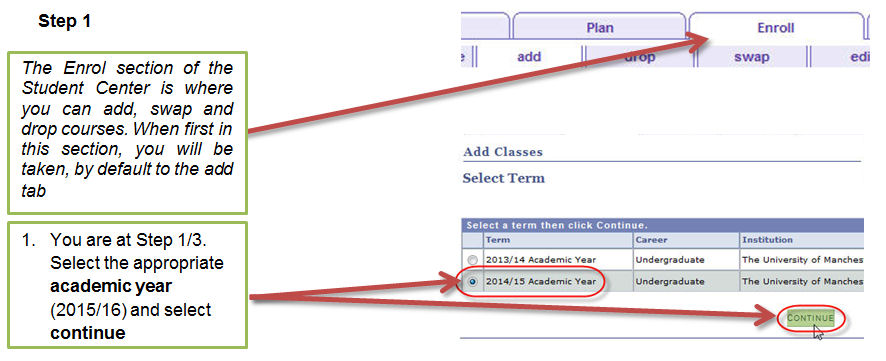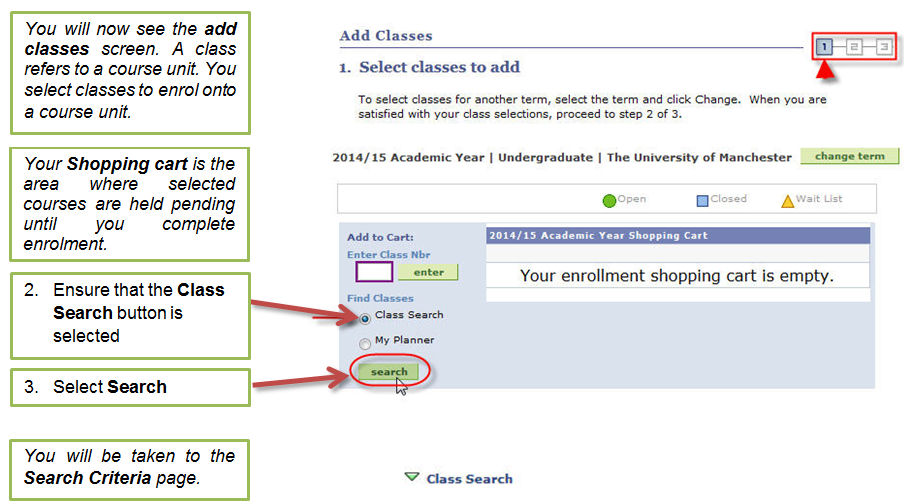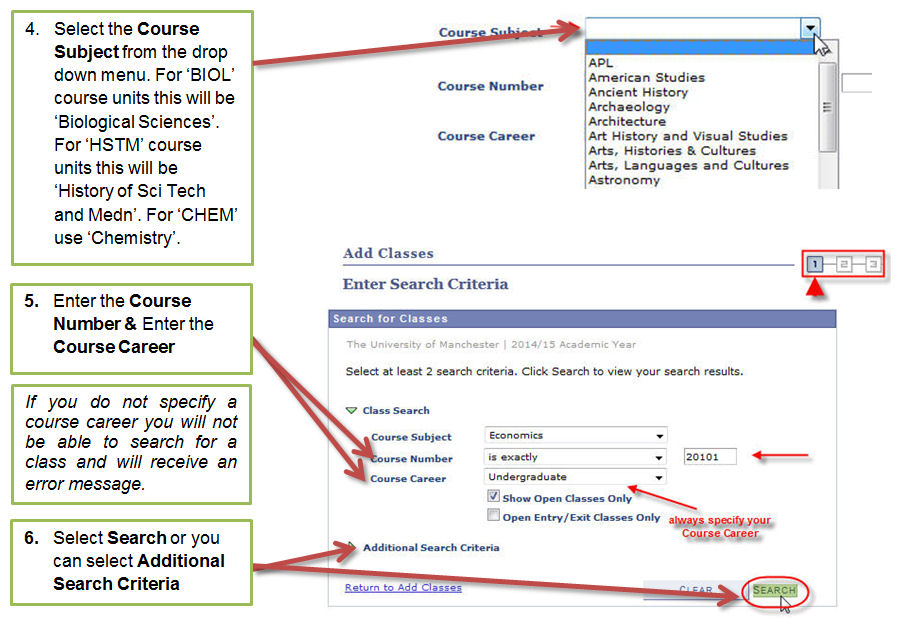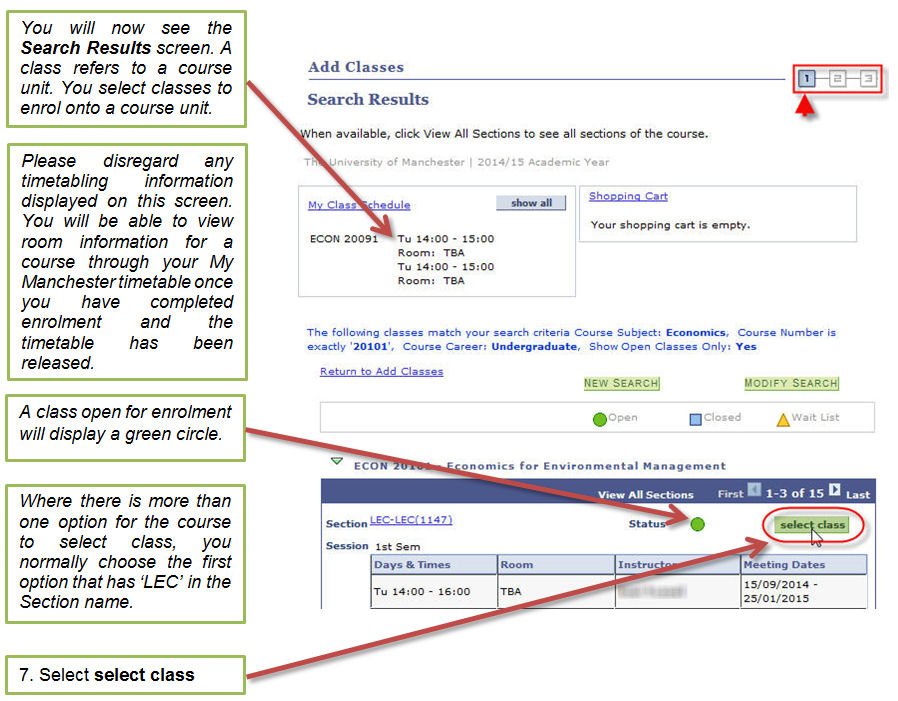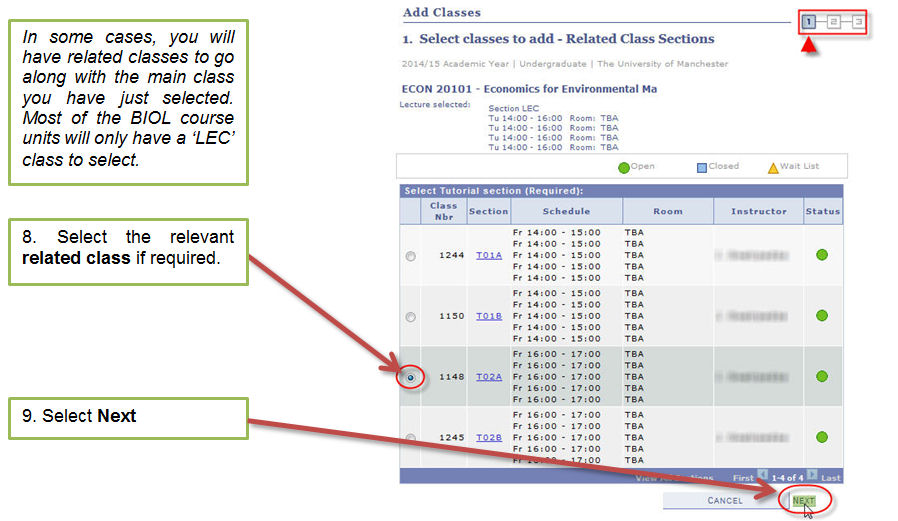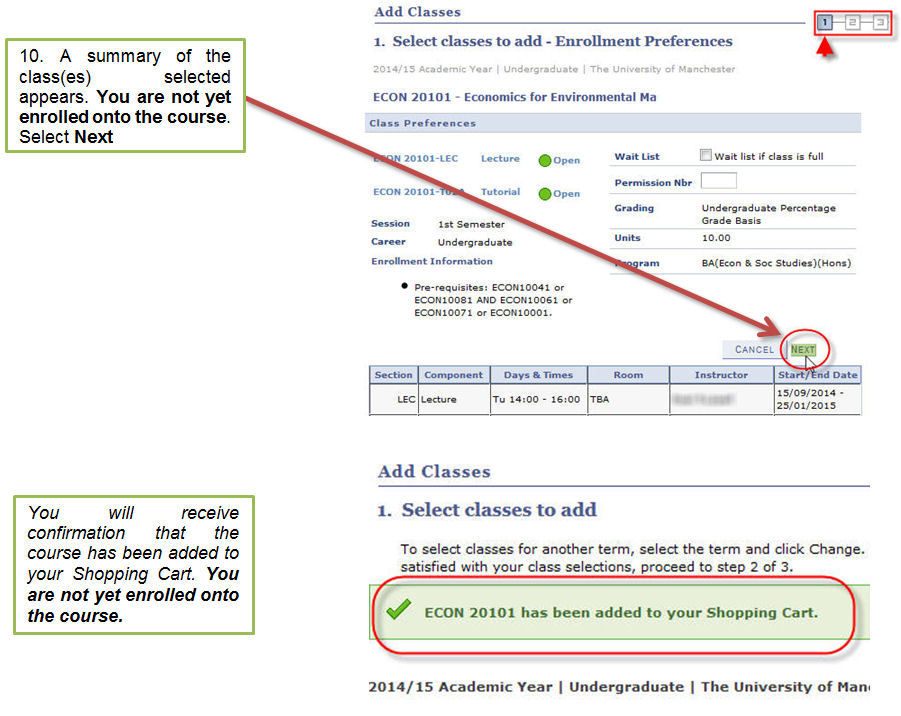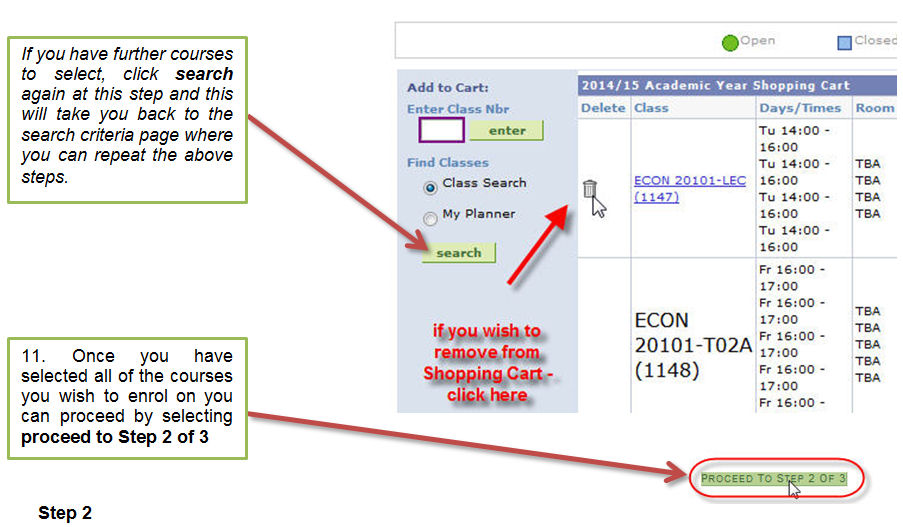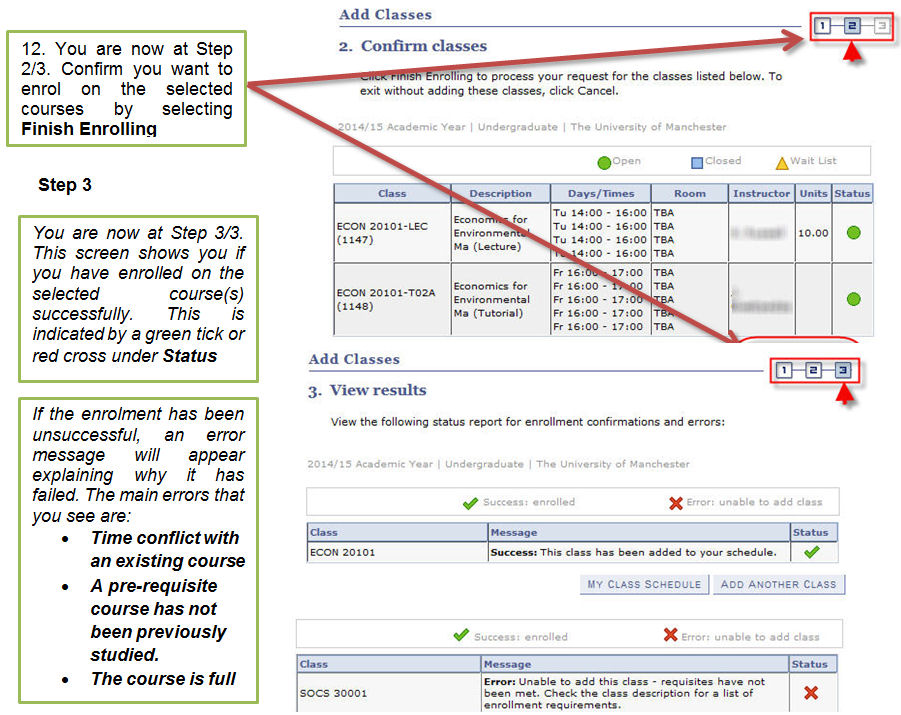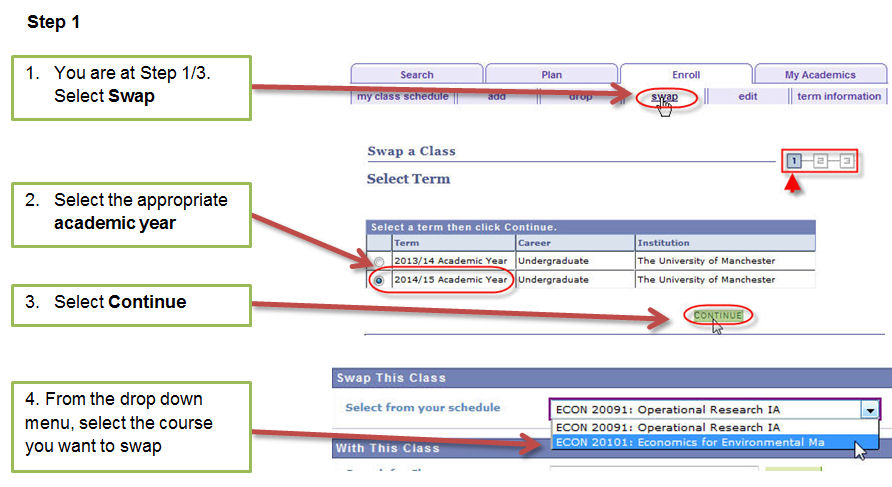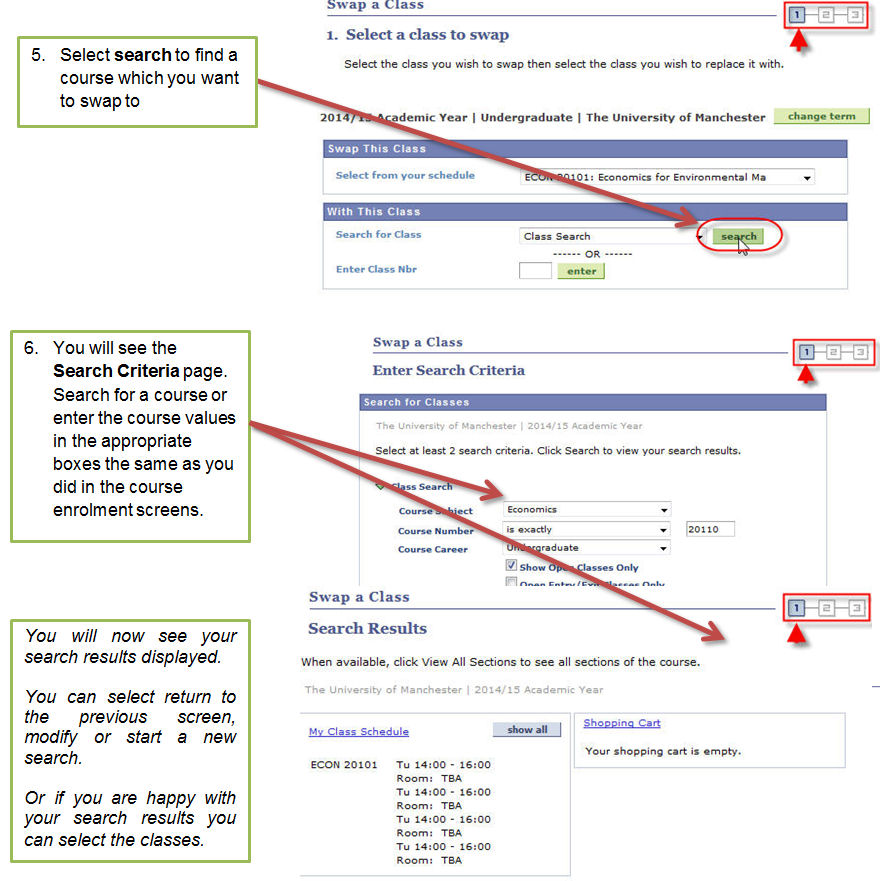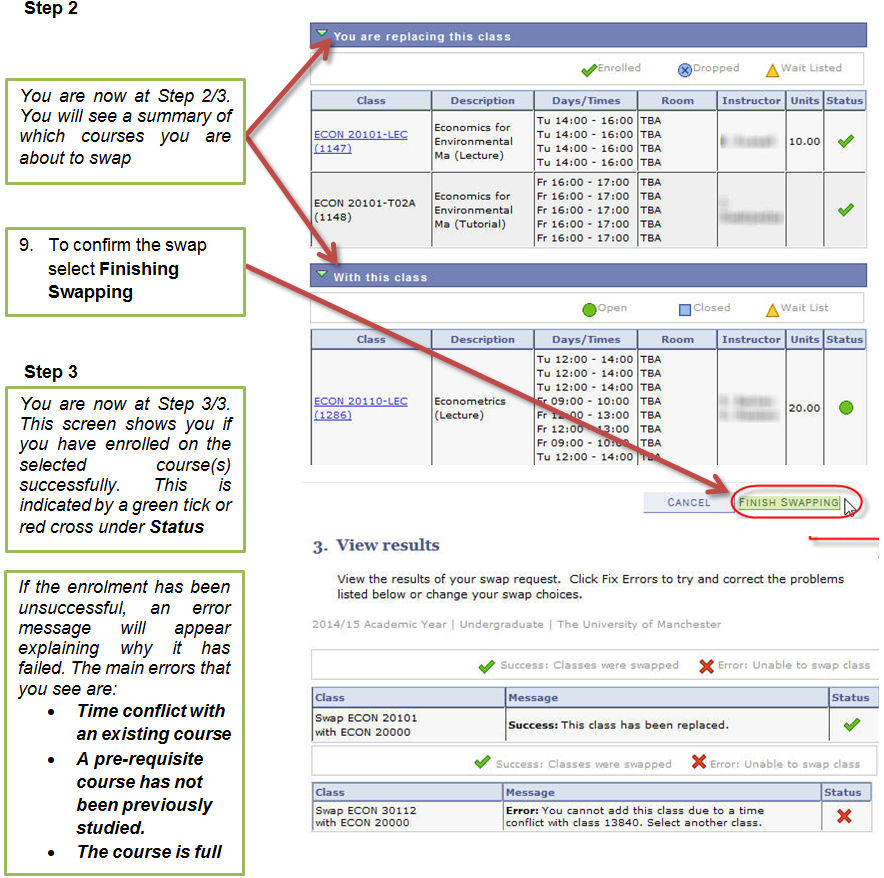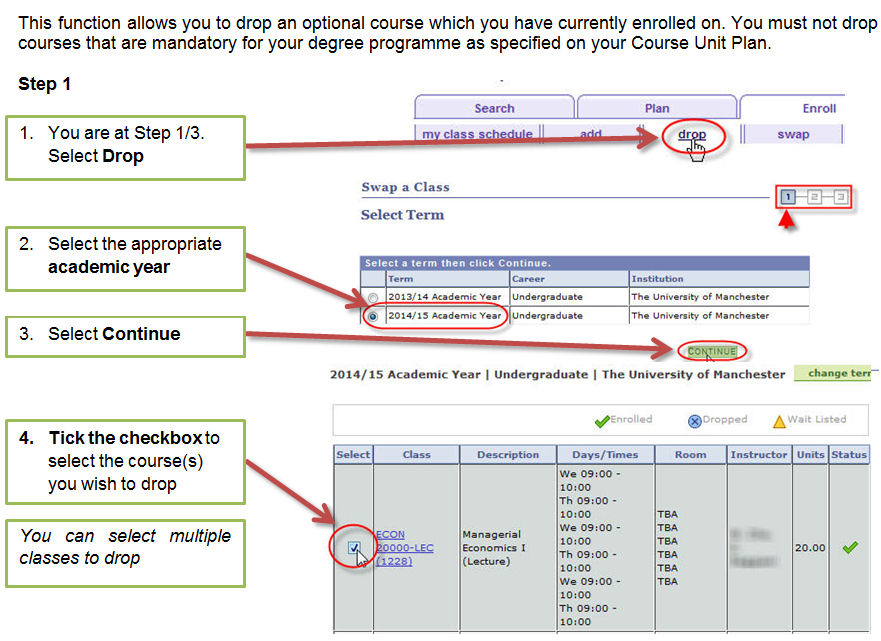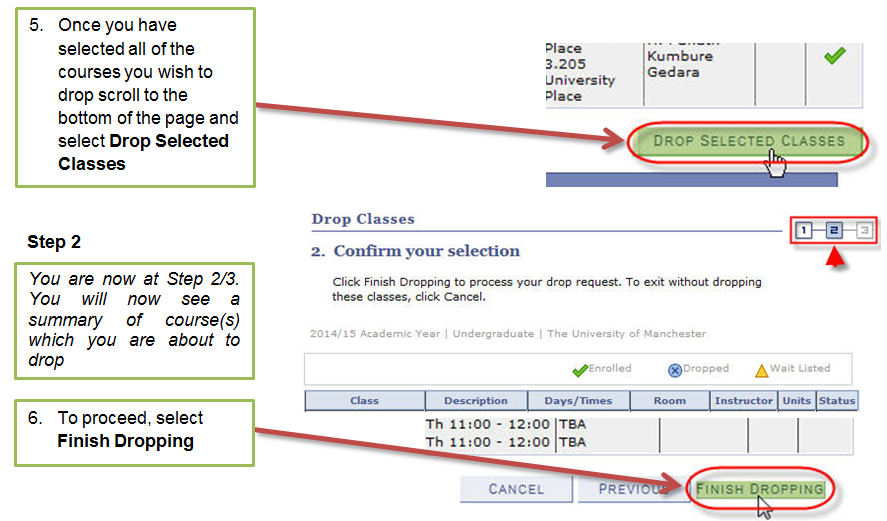Course Unit Selection - LEVEL 2 students
By September 2019, you will have already completed steps 1-4 and the information provided below is a reminder of these steps. From September 2019, you should follow step 5 and step 6 if necessary.
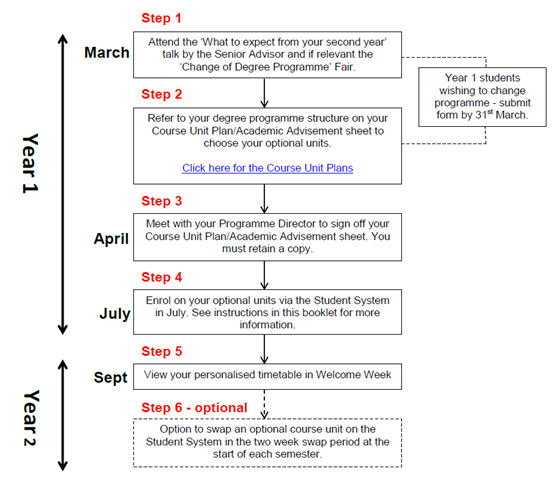
Academic Advisement sheets can be found on the Faculty intranet at the following link: https://www.intranet.ls.manchester.ac.uk/education/cm/academicadvisement.aspx
Step 1 – What to expect from your second year talk
What to expect from your second year talk
The ‘What to expect from your second year talk’ and Programme Director Fair for students considering changing programme took place on Monday 11th March 2019. Information was given about:
- Course unit selection (including University College for Interdisciplinary Learning or UCIL units)
- Dissertations
- Research Skills Modules (RSMs)
- Field Course RSMs
- Changing degree programme
- Industrial placements
If you are considering changing programme, please note that the deadline to submit a completed degree programme changhe form was Friday 5th April 2019.
Programme changes across degree subjects will be actioned on the Student System at the end of the current academic year.
Provided you have submitted a form by the deadline, you should attend the Programme Director Clinic in the weerk commencing 29thApril for your new programme.
Note: It is not normally possible to transfer into/or from the Joint Honours Programme of Cognitive Neuroscience & Psychology.
Step 2 – Choosing your optional units
 Degree Programme requirements
Degree Programme requirements
The requirements for each Degree Programme are laid out in a table at the below links. The table is designed to enable you to check which units are mandatory for your Degree Programme and which are recommended optional units. You may be able to take other units but you must be able to fit them into your timetable and you should talk to your Programme Director or Academic Tutor about this.
More detailed information on your Degree Programme structure for each level of study can be found on the Faculty intranet under the heading ‘academic advisement’ - https://www.intranet.ls.manchester.ac.uk/education/cm/academicadvisement.aspx
Academic Advisement is the term used in Campus Solutions for the way in which Degree Programmes are structured, e.g. which course units students take in each academic year, which of those units are mandatory, and which units may be selected as options. By following the above link you will be able to access the academic advisement documents for your Degree Programme. These sheets are used at registration for your Programme Director to agree your choice of units with you.
The field courses are:
BIOL20552 Tropical Ecology & Conservation (Summer vacation)
BIOL20872 Urban Biodiversity & Conservation
BIOL21422 Alpine Biodiveristy & Forest Ecology (Summer vacation)
Course unit profiles
Profiles of the course units on offer from the School of Biological Sciences for the current academic year can be found via your MyManchester portal, as well as on the intranet. Profiles include Aims, Intended Learning Outcomes, lecture and/or practical content, along with details of the assessments, recommended texts and prerequisites. The Unit Coordinator and principal lecturers teaching on the unit are also listed. A list of the employability skills that the course unit will allow you to develop is also given; employers often ask for examples of these skills when applying for a job, either within your CV, on their job application form or during interviews. In addition to MyManchester, course unit information is also available on the School’s intranet.
If you have any questions about a unit once it has started, you should approach the lecturer directly, or consult the Unit Coordinator.
Students wishing to contact a Unit Coordinator directly should do so by email.
Full descriptions of language units for those students taking the four-year degrees with a language are available from the Course unit information portlet.
In addition, information on course units run by the University College for Interdisciplinary Learning (available University-wide) can be found on their website. Details of how to contact the College are listed below.
Please note, although students are permitted to take units outside the School, timetable constraints may not allow some of these units to be taken in conjunction with some compulsory School. Please discuss this with your Programme Director.
Manchester Business School (BMAN units)
For further information please consult the BMaP Student Handbook and timetabling information at the following link: https://ughandbook.portals.mbs.ac.uk/Non-AllianceMBSstudents/BMaPcoursesandapplicationprocess.aspx
School of Arts, Languages and Cultures – Language units
Students registered on a ‘with language’ Degree Programme only.
If you are on a ‘with language’ degree, you will be able to self-select your Language units alongside your optional BIOL units on the Student System. If you have any problems with enrolling on your Language units please contact the language department:
School of Arts, Languages and Cultures
Faculty of Humanities
Samuel Alexander Building
www.alc.manchester.ac.uk
Languages Student Information Point
Tel: 0161 275 8311 / 0161 306 0396
Email: Salc-languages@manchester.ac.uk
Manchester Enterprise Centre (MCEL units)
Details of the course units offered and contact details can be found at the following link:
https://mec.portals.mbs.ac.uk/StudyEnterpriseWithUs/Undergraduateunits.aspx
School of Psychological Sciences (PSYC units)
PLEASE NOTE: PSYC units are only taken by students enrolled on the Cognitive Neuroscience & Psychology programme.
For information on PSYC units please contact ug.psychology@manchester.ac.uk.
School of Psychological Sciences
Coupland 1 Building
Coupland Street
https://www.bmh.manchester.ac.uk/psychology/
Programme Director – Dr Jennifer McBride (jennifer.mcbride@manchester.ac.uk)
University College (UCIL, ULBS, ULAR & ULCH units)
The University College for Interdisciplinary Learning presents an opportunity for students to broaden their educational horizons. It offers courses that showcase the research and knowledge found at the University and encourages student to go beyond the boundaries of their Degree Programme.
See the University College website for further information on available course units http://www.college.manchester.ac.uk/courses/. Students wishing to enrol on University College units can do so by self-selection via the Student System.
The Manchester Leadership Programme (MLP)
| UCIL20021 | Leadership in Action (sem 1) |
| UCIL20022 | Leadership in Action (sem 2) |
| UCIL20020 | Leadership in Action (sem 1&2) |
| UCIL20031 | Leadership in Action (sem 1) - online unit |
See the Manchester Leadership Programme website for further details of the course units on offer The Manchester Leadership Programme offers a unique combination of academic units and volunteering. MLP students:
- Learn the importance of leadership that promotes social, economic and environmental sustainability
- Gain an insight into some of the key issues facing 21st-century societies.
- Develop practical skills such as team working, project management and presentation skills.
Helpful hints
|
||||||||||||||||||
*Providing you have the pre/co-requisites, excluding EDMs, RSMs and field courses. |
Level 2 Clash Groups
Biological Sciences units that do not appear in the list below do not clash with any other life science unit and can therefore be taken in conjunction with any unit offered from within the School with the advice of your Programme Director.
No compulsory units should clash. If it seems that they do for you (e.g. with compulsory language units), please go to the Student Support Office as soon as possible (and well before the day of the first clash) to resolve this.
Semester 3
Clash group 1
BIOL21111 – Proteins
BIOL21281 – Animal Physiology
Clash group 2
BIOL21221 – Animal Diversity
BIOL21321 – Membrane Excitability
Clash group 3
BIOL21101 – Genome Maintenance & Regulation
BIOL21341 – Sensory Systems
Clash group 4
BIOL21261 – Endocrinology
BIOL21371 – Organismal Genetics
Clash group 5
BIOL21291 – Human Anatomy & Histology
BIOL21211 – Ecology and Ecosystems
BIOL21381 – Introduction to Virology
Clash group 6
BIOL21361 – Haematology
BIOL21181 – Prokaryotic Microbiology
Clash group 7
BIOL21451 – How To Make A Brain
BIOL211121 – The Dynamic Cell
Clash group 8
BIOL21451 – How To Make A Brain
BIOL21211 – Ecology and Ecosystems
Clash group 9
BIOL21141 - Cell Membrane and Structure
HSTM20031 From Cholera to Aids
Semester 4
Clash group 1
BIOL21132 – Cell Metabolism & Metabolic Control
BIOL21432 – Animal Behaviour
Clash group 2
BIOL21332 – Motor Systems
BIOL21152 – Omic Technologies and Resources
Clash group 3
BIOL21412 – Drugs, Models and Mechanisms
HSTM20092 – The Crisis of Nature
Clash group 4
BIOL21192 – Principles of Infectious Disease
CHEM21162 – Chemistry of Biomolecules
Clash group 5
BIOL21172 – Principles of Developmental Biology
BIOL21302 – Clinical Drug Development
Clash group 6
BIOL21232 – Fundamentals of Evolutionary Biology
BIOL21272 – Gut and Renal Human Physiology
Clash group 7
BIOL21202 – Plants for the Future
BIOL21402 – Anatomy of the Special Sense Organs
Clash group 8
BIOL21402 – Anatomy of the Special Sense Organs
BIOL21442 – Disease in Nature
Clash group 9
BIOL21312 – Drugs and the Brain
BIOL21152 – Omic Technologies and Resources
Clash group 10
BIOL21232 – Fundamentals of Evolutionary Biology
BIOL21312 – Drugs and the Brain
Clash group 11
BIOL21332 – Motor Systems
BIOL21202 – Plants for the Future
Second level units with pre-/co-requisite units
Listed below are all of the second level units from the School of Biological Sciences with pre-/co-requisite units. If a unit has pre-/co-requisites, this means that you may need to take the prerequisite unit(s) in order to take this unit. For example, BIOL10221 and BIOL10521 are compulsory prerequisites for BIOL20332, therefore, if you did not take these units in your first year, you will not be able to take BIOL20332 in your second year.
Bold indicates a compulsory prerequisite, italics indicate a recommended prerequisite.
| Unit Code | Title |
Pre-/co-requisite Unit Code |
Title |
| BIOL20302 | Science & Society RSM | HSTM10721 | Science & the Modern World |
| BIOL20322 | Cell Biology RSM | BIOL21121 | The Dynamic Cell |
| BIOL20332 | Genetics RSM | BIOL10221 | Molecular Biology |
| BIOL10521 | Genes, Evolution & Development | ||
| BIOL21172 | Principles of Developmental Biology | ||
| BIOL21371 | Organismal Genetics | ||
| BIOL20342 | Microbiology RSM |
BIOL10532 BIOL21181 |
Microbes, Man & the Environment Prokaryotic Microbiology |
| BIOL20872 | Urban Biodiversity & Conservation RSM | Strongly recommended that students take a first year field course | |
| BIOL20912 | Anatomy RSM | BIOL10811 | Body Systems |
| BIOL21061 | Human Sciences EDM | ||
| BIOL21291 | Human Anatomy & Histology | ||
| BIOL20922 | Neuroscience RSM | BIOL10832 | Excitable Cells: the Foundations of Neuroscience |
| BIOL21332 | Motor Systems | ||
| BIOL21341 | Sensory Systems | ||
| BIOL20932 | Pharmacology RSM | BIOL21302 |
Clinical Drug Development OR |
| BIOL21412 | Drugs: Models and Mechanisms | ||
| BIOL20942 | Physiology RSM | BIOL10832 | Excitable Cells: the Foundations of Neuroscience |
| BIOL21141 |
Cell Membrane Structure & Function OR |
||
| BIOL21321 | Membrane Excitability: Ion Channels & | ||
| Transporters in Action | |||
| BIOL20952 | Immunology RSM |
BIOL21242 BIOL21252 |
Immunology Parasitology |
| BIOL20972 | Developmental Biology RSM |
BIOL10221 BIOL10521 |
Molecular of Biology Genes, Evolution & Development |
| BIOL21172 | Principles of Developmental Biology | ||
| BIOL21371 | Organismal Genetics | ||
| BIOL21101 | Genome Maintenance & Regulation | BIOL10221 | Molecular Biology |
| BIOL10212 | Biochemistry | ||
| BIOL21111 | Proteins | BIOL10212 | Biochemistry |
| OR | CHEM10021 | Chemistry for Bioscientists 1 | |
| OR | CHEM10022 | Chemistry for Bioscientists 2 | |
| BIOL21121 | The Dynamic Cell | BIOL10232 | From Molecules to Cells |
| BIOL21132 | Cell Metabolism & Metabolic Control | BIOL21111 | Proteins |
| BIOL21141 | Cell Membrane Structure & Function | BIOL10212 | Biochemistry |
| BIOL10232 | From Molecules to Cells | ||
| BIOL21152 | ‘Omic Technologies & Resources | BIOL10221 | Molecular Biology |
| BIOL21101 | Genome Maintenance & Regulation | ||
| BIOL21172 | Principles of Developmental Biology | BIOL10521 | Genes, Evolution & Development |
| BIOL21181 | Prokaryotic Microbiology | BIOL10532 | Microbes, Man & the Environment |
| BIOL21192 | Principles of Infectious Disease | BIOL10532 | Microbes, Man & the Environment |
| BIOL21181 | Prokaryotic Microbiology | ||
| BIOL21242 | Immunology | ||
| BIOL21202 | Plants for the Future | BIOL10511 | Biodiversity |
| BIOL21232 | Fundamentals of Evolutionary Biology | BIOL10521 | Genes, Evolution & Development |
| BIOL21272 | Gut and Renal Human Physiology | BIOL21141 | Cell Membrane Structure & Function |
| BIOL21321 | Membrane Excitability: Ion Channels & | ||
| Transporters in Action | |||
| BIOL21291 | Human Anatomy & Histology | BIOL10811 | Body Systems |
| BIOL21302 | Clinical Drug Development | BIOL10822 | Drugs: From Molecules to Man |
| BIOL21312 | Drugs & the Brain | BIOL10822 | Drugs: From Molecules to Man |
| BIOL21302 | Clinical Drug Development | ||
| BIOL21321 | Membrane Excitability: Ion Channels & Transporters in Action | BIOL10832 | Excitable Cells: the Foundations of Neuroscience |
| BIOL21332 | Motor Systems | BIOL10832 | Excitable Cells: the Foundations of Neuroscience |
| BIOL21341 | Sensory Systems | ||
| BIOL21341 | Sensory Systems | BIOL10832 | Excitable Cells: the Foundations of Neuroscience |
| BIOL21351 | Molecules and Cells in Human Disease | BIOL10232 | From Molecules to Cells |
| BIOL10822 | Drugs: From Molecules to Man | ||
| BIOL21361 | Haematology | BIOL10212 | Biochemistry |
| BIOL10401 | Introduction to Laboraory Science | ||
| BIOL10811 | Body Systems | ||
| BIOL21371 | Organismal Genetics | BIOL10221 | Molecular Biology |
| BIOL10521 | Genes, Evolution & Development | ||
| BIOL21402 | Anatomy of the Special Sense Organs | BIOL21291 | Human Anatomy & Histology |
| BIOL21412 | Drugs: Models & Mechanisms | BIOL10822 | Drugs: From Molecules to Man |
| BIOL20932 | Pharmacology RSM | ||
| BIOL21432 | Animal Behaviour | BIOL10521 | Genes, Evolution and Development |
| BIOL21232 | Fundamerntals of Evolutionary Biology | ||
| BIOL21442 | Disease in Nature | BIOL10532 | Microbes, Man & the Environment |
| BIOL21211 | Ecology & Ecosystems | ||
| BIOL21451 | How to Make a Brain | BIOL10832 | Excitable Cells: the Foundations of Neuroscience |
Second level units that are pre-/co-requisites for final level units
Listed below are all of the final level units in the School of Biological Sciences which have level 2 units as pre-/co-requisites. If a unit has pre-/co-requisites, this means that you will need to take the prerequisite unit(s) in order to take this unit. For example, BIOL21111 is a compulsory prerequisite for BIOL31311, therefore, if you did not take BIOL21111 in your second year, you will not be able to take BIOL31311 in your final year.
Bold indicates a compulsory prerequisite, italics indicate a recommended prerequisite
| Unit Code | Title | Prerequisite Unit Code | Prerequisite Unit Title |
| BIOL31301 | Post-Genome Biology | BIOL21152 | ‘Omic Technologies & Resources |
| BIOL31311 | Protein Assembly, Dynamics & Function | BIOL21111 | Proteins |
| BIOL31321 | Glycobiology: Glycan Function in Health & Disease |
BIOL21111 BIOL21162 |
Proteins Chemistry of Biomolecules |
| BIOL31332 | Biochemical Basis of Disease | BIOL21132 | Cell Metabolism & Metabolic Control |
| BIOL31341 | Macromolecular Recognition in Biological Systems | BIOL21111 | Proteins |
| BIOL31351 | Current Topics in Microbiology | BIOL21181 | Prokaryotic Microbiology |
| BIOL31362 | Bacterial Infections of Man | BIOL21192 | Principles of Infectious Disease |
| BIOL31371 | Advanced Immunology | BIOL21252 | Parasitology |
| BIOL21242 | Immunology | ||
| BIOL21192 | Principles of Infectious Disease | ||
| BIOL31381 | Gene Regulation and Disease | BIOL21101 | Genome Maintenance & Regulation |
| BIOL21152 | ‘Omic Technologies & Resources | ||
| BIOL31391 | Evolution of Genes, Genomes & Systems | BIOL21232 | Fundamentals of Evolutionary Biology |
| BIOL31402 | Human Genetics and Evolution | BIOL21232 | Fundamentals of Evolutionary Biology |
| BIOL21371 | Organismal Genetics | ||
| BIOL31411 | Protein Sorting | BIOL21141 | Cell Membrane Structure & Function |
| BIOL31441 | Cell Signalling | BIOL21101 | Genome Maintenance & Regulation |
| BIOL21121 | The Dynamic Cell | ||
| BIOL21141 | Cell Membrane Structure & Function | ||
| BIOL21261 | Endocrinology | ||
| BIOL21351 | Molecules and Cells in Human Disease | ||
| BIOL31451 | Comparative Developmental Biology | BIOL21172 | Principles of Developmental Biology |
| BIOL31471 | Advanced Behavioural and Evolutionary Ecology | BIOL21232 | Fundamentals of Evolutionary Biology |
| BIOL21432 | Animal Behaviour | ||
| BIOL31482 | Conservation Biology | BIOL21232 | Fundamentals of Evolutionary Biology |
| BIOL31501 | Green Biotechnology | BIOL21152 | ‘Omic Technologies & Resources |
| BIOL21202 | Plants for the Future | ||
| BIOL31511 | Biotic Interactions | BIOL21202 | Plants for the Future |
| BIOL21212 | Ecology & Ecosystems | ||
| BIOL31541 | Living with Climate Change | BIOL21212 | Ecology & Ecosystems |
| BIOL31551 | Human Impacts on the Biosphere |
BIOL21211 BIOL21212 |
Ecology & Ecosystems
|
| BIOL31561 | Human Reproductive Biology | BIOL21261 | Endocrinology |
| BIOL31571 | Advanced Endocrinology | BIOL21261 | Endocrinology |
| BIOL31582 | Cardiovascular Systems | BIOL21141* | Cell Membrane Structure & Function |
| * one of these units must be taken as a compulsory pre-requisite | BIOL21321* | Membrane Excitability: Ion Channels & Transporters in Action | |
| BIOL21272 |
Gut and Renal Human Physiology |
||
| BIOL31591 | Advanced Ion Transport | ||
| * one of these RSM units must be taken as a compulsory pre-requisite | BIOL20922* | Neuroscience RSM | |
| BIOL20932* | Pharmacology RSM | ||
| BIOL20942* | Physiology RSM | ||
| BIOL21321 | Membrane Excitability: Ion Channels & Transporters in Action | ||
| BIOL31602 | Toxins, Toxicants & Toxicity | BIOL21302 | Clinical Drug Development |
| BIOL31612 | Neuroinflamation in Health and Disease | BIOL21312 | Drugs & the Brain |
| BIOL31622 | Ion Transport in Health and Disease | BIOL20922* | Neuroscience RSM |
| * one of these RSM units must be taken as a compulsory pre-requisite | BIOL20932* | Pharmacology RSM | |
| BIOL20942* | Physiology RSM | ||
| BIOL31642 | Advanced Developmental Biology | BIOL21172 | Principles of Developmental Biology |
| BIOL31651 | Advances in Anatomical Sciences | BIOL20912 | Anatomy RSM |
| BIOL21291 | Human Anatomy & Histology | ||
| BIOL21402 | Anatomy of the Special Sense Organs | ||
| BIOL31671 | Neuropharmacology of Human Health | BIOL21312 | Drugs & the Brain |
| BIOL31681 | Clocks, Sleep and Rhythms of Life | BIOL21332 | Motor Systems |
| BIOL21341 | Sensory Systems | ||
| BIOL31691 | Learning, Memory and Cognition | BIOL21332 | Motor Systems |
| BIOL21341 | Sensory Systems | ||
| BIOL31721 | Hormones and Behaviour | BIOL21261 | Endocrinology |
| BIOL31742 | Molecular Biology of Cancer | BIOL21101 | Genome Maintenance & Regulation |
| BIOL21121 | The Dynamic Cell | ||
| BIOL31751 | Stem Cells | BIOL21121 | The Dynamic Cell |
| BIOL21172 | Principles of Developmental Biology | ||
| BIOL21351 | Molecules and Cells in Human Disease | ||
| BIOL31771 | Cell Adhesion | BIOL21121 | The Dynamic Cell |
| BIOL31792 | Advanced Parasitology | BIOL21242 | Immunology |
| BIOL21252 | Parasitology | ||
| BIOL31802 | Immune Response and Disease | BIOL21242 | Immunology |
| CHEM31812 | Chemistry of Biological Processes | CHEM21162 | Chemistry of Biomolecules |
Withdrawal of units
The information provided is correct at the time of publication. The School reserves the right to withdraw or alter units should there be changes in academic staff or insufficient registrations.
Step 3 – Meeting your Programme Director
You are required to attend a meeting with your Programme Director to choose your optional units for the second year of your degree. At this meeting you will be able to discuss your options with your Programme Director before making your choices. You will complete a Course Unit Plan with your Programme Director at the meeting to record your choice of units - you must retain a copy for your records.
*It is important that you retain a copy of your Course Unit Plan as you will need to enrol on your optional units yourself over the summer period.*
Copies of the second year draft 2020-21 timetable will be made available at the meeting so you can choose clash free options, however please note that the timetable is still draft at this stage as we do not have final timetable allocations until the end of the summer. No compulsory units should clash. You must make sure that your timetable is clash free when you return in September when room booking information has been released.
There are two reasons for asking you to choose optional units at this time of year; i) to provide all students with a personalised timetable at the beginning of the new academic year; ii) to ensure that the lecture theatres booked for your lectures are of an appropriate capacity for the cohort. You will, of course, still be able to change optional course units at the beginning of each semester (up to the end of week 2) should you need to.
The Programme Director Course Unit Selection Clinics will take place w/c 20th April 2020 and a detailed timetable can be found on the intranet.
Step 4 – Enrolling on your optional units
IMPORTANT NOTES
You should already be enrolled on your mandatory units by the Student Support Office however you MUST enrol on your optional units yourself listed on your signed off Course Unit Plan from 22nd July - 12th August. Please note, that for those on a degree programme witha a choice of RSM, you will be enrolled on the BIOL21602 Dummy RSM Unit until the RSM allocations have been finalised in September. Once they have been finalised the Student Support Office will transfer you to your allocated RSM.
‘With Language’ degree students
If you are on a ‘with language’ degree, you will be able to self-select your Language units alongside your optional BIOL units on the Student System. If you have any problems with enrolling on your Language units please contact the language department (see section School of Arts, Languages and Cultures – Language units).
University College for Interdisciplinary Learning (UCIL) course units.
You will not be able to self-enrol on the following UCIL units:
- Leadership of Learning - UCIL20001 / 20002 / 21002
- Physics and the Grand Challenges of Today – UCIL29002
- Language courses – ULBS20011 / 20012, ULAR10031 and ULCH10022
To enrol on any of these units please email universitycollege@manchester.ac.uk.
Language Enhancement Access Programme (LEAP)
The University offers courses to students who wish to study a language as part of LEAP. Further information is available from: www.langcent.manchester.ac.uk/undergraduate/leap.
If you are considering registering for a language module you must discuss this with your Programme Director. If your Programme Director authorises your application for a LEAP course, you must enrol with the LEAP office by filling in an enrolment form which can be accessed at the link below. Enrolment will be conducted on a first-come first-served basis and you are therefore strongly advised not to leave it too late.
Manchester Leadership Programme (MLP)
You are now able to self-enrol onto an MLP course units. There are a very limited number of places so please ensure you complete enrolment early to avoid disappointment
Manchester Enterprise Centre units (MCEL)
Please contact MCEL directly to enrol on an optional MCEL unit. Details of the course units offered and contact details can be found at the following link: https://mec.portals.mbs.ac.uk/StudyEnterpriseWithUs/Undergraduateunits.aspx.
Business and Management for all Programmes (BMAN units)
If you wish to take a BMaP course and you meet the pre and co-requisites detailed on the online course database please complete the online application form: https://ughandbook.portals.mbs.ac.uk/Non-MBSstudents/BMaPcoursesandapplicationprocess.aspx
School of Psychological Sciences (PSYC units)
PLEASE NOTE: PSYC units are only taken by students enrolled on the Cognitive Neuroscience & Psychology Programme. For information on PSYC units please contact ug.psychology@manchester.ac.uk https://www.bmh.manchester.ac.uk/psychology/.
Compensated passes and referrals in pre-requisite units
If you have a compensated pass e.g. 32C for a pre-requisite unit of a second year unit, you will not be able to self-enrol for the unit on the Student System. Similarly if you have a referral/re-sit for a pre-requisite unit of a second year unit you will not be able to self-enrol for the unit on the Student System. If this applies to you please email the Student Support Office so they can enrol you: studentsupportoffice.sbs@manchester.ac.uk.
Logging in to the Student System

Step 5 - Viewing your personalised timetable
Your personalised timetable is in My Manchester from Welcome Week onwards. Please note that when you change your Course Unit Selections it will take at least 24 hours to update your personalised timetable. No compulsory units should clash. If it seems that they do for you (e.g. with compulsory language units), please go to the Student Support Office as soon as possible (and well before the day of the first clash) to resolve this.
BIOL20000 Academic Tutorials Year 2
Your Academic Tutor will notify you of the time and location of your tutorial.
There will also be a copy of the timetable permanently displayed on the intranet. Many of the practicals have alternative sessions. You will be allocated to groups that should avoid timetable clashes based on the combination of units that you select. If you discover that you do seem to have a timetable clash, please contact the Student Support Office at the earliest opportunity and well before the practicals in question. Group details will be displayed on the second year notice board in the Stopford Building and on the Blackboard area for the unit prior to your first practical session.
Step 6 - Swapping an optional course unit
You may change any optional units (except RSMs, including field courses, and language units that run for two semesters) at the beginning of each semester (during the first two weeks). To do this you will need to log into your Student System in the same way as you did when you completed course unit selection. Further instructions are shown below. Please note that you must ensure that you do not drop or swap any course unit that is a mandatory course unit within your programme regulations. You must ensure that any changes you make to your course unit selections still satisfy your programmes academic advisement rules. Academic advisement rules can be found at the following link: https://app.bmh.manchester.ac.uk/education/cm/academicadvisement.aspx.
Please note that enrolment reports will be sent to your Programme Directors for checking and you will be contacted if your enrolment selections are not satisfactory. Failure to swap a unit before the end of the two week course unit swap period may mean you will not be allowed to register for the examinations in the unit to which you have changed. You will not normally be allowed to transfer off or onto a unit after the end of the second week of teaching (Friday 5pm) in each semester.
Drop, Swap and Edit a Course unit
Once you have enrolled for a course unit(s) you can make changes to your selection by using the drop and swap functionality. You will need to log into your Student System in the same way as you did when you completed the course enrolment. https://www.portal.manchester.ac.uk/. For all three functionalities you must select the Student Center and then select Enrol as shown below.
*It is important that you do not drop or swap any course unit that is a mandatory course unit within your programme regulations.*
Swapping a Course
This function allows you to change the courses you have already enrolled upon in a single process; instead of dropping a course and then adding a new one.
Help and Support
COURSE UNIT SELECTION DROP-IN CLINICS
- Wednesday 18th September 10:00-16:00 - Year 1 only
- Thursday 19th September 10:00-13:00 - All years
- Friday 20th September 16:00-17:00 - All years
- Tuesday 24th September 12:00-13:00 - Year 1 only
All sessions are in Stopford Building, PC Cluster 1 (located near the reception at the front of the Stopford Building).
REGISTRATION AND IT SERVICES HELPLINE
Please contact:
+44(0) 161 306 5544 (09.00 – 17.00, Monday to Friday)
Email: ssc@manchester.ac.uk
WRONG PROGRAMME/PROBLEMS WITH MANDATORY AND OPTIONAL UNITS
School of Biological Sciences Student Support Office
G.483 Stopford Building
Tel: 44 (0)161 275 1487 (08.30 – 17.00, Monday to Friday)
Email: studentsupportoffice.sbs@manchester.ac.uk
Glossary
Campus Solutions Glossary of Terms
Introduction
This Glossary describes terms used in the Campus Solutions Student System and describes general usage including University of Manchester terminology.
| Campus Solutions Term | University Of Manchester Usage/Definition | Alternative Terminology |
| Academic Career | Study path e.g. Undergraduate, Postgraduate Taught | Career/Study Level |
| Academic Group | Any body that can offer a course be it Faculty, School, Division, Subject Area | School/Faculty |
| Academic Plan | A plan of the programme especially where there are specialisations | Programme |
| Academic Programme | A course of Study made up of one or more course units which leads to an award | Programme |
| Class | A scheduled instance of a course unit | Session |
| Class Enrolment | Choice and enrolment of both mandatory and optional course units | Course Unit Selection |
| Course | An individual study unit of the programme | Course Unit or Module |
| Degree | The award normally achieved at the end of the programme | Award |
| Emplid/ID | The number generated by Campus Solutions unique to the individual, whatever the role. For students it will also be their registration number. | Person ID/Registration Number |
| Facility | Class or meeting venue | Building |
| Matriculate | The process by which applicants are converted to students. | Roll Forward |
| Session | A session can be either one of the two semesters or the full term | Semester |
| Term | Academic year running from September to June | Academic Year |
| Term Activate | The process by which the system is informed that admitted and matriculated students are eligible to enrol on classes in a particular term | Expected to register |
| Units | An award is achieved by attaining a mandatory amount of units (units are earned by completion of a course) | Credits |
Campus Solutions Progression Terminology
- ACTV (Activate) – progress normally or complete successfully
- REVW (Review)
- ACTR (Activate Pending Re-sit Results)
- RYIA (Repeat Part Year in Attendance)
- RYOA (Repeat Year Out of Attendance)
- SPCL (Special Circumstances)

